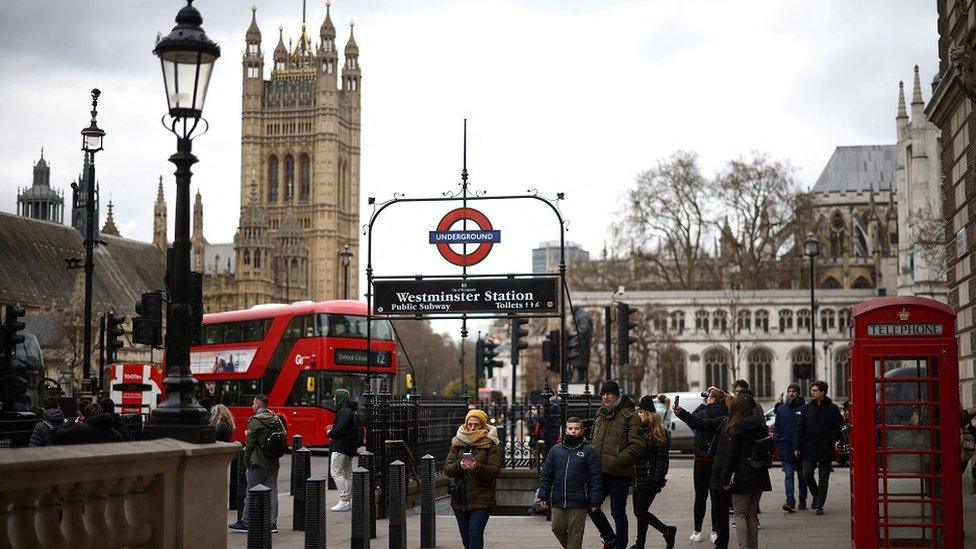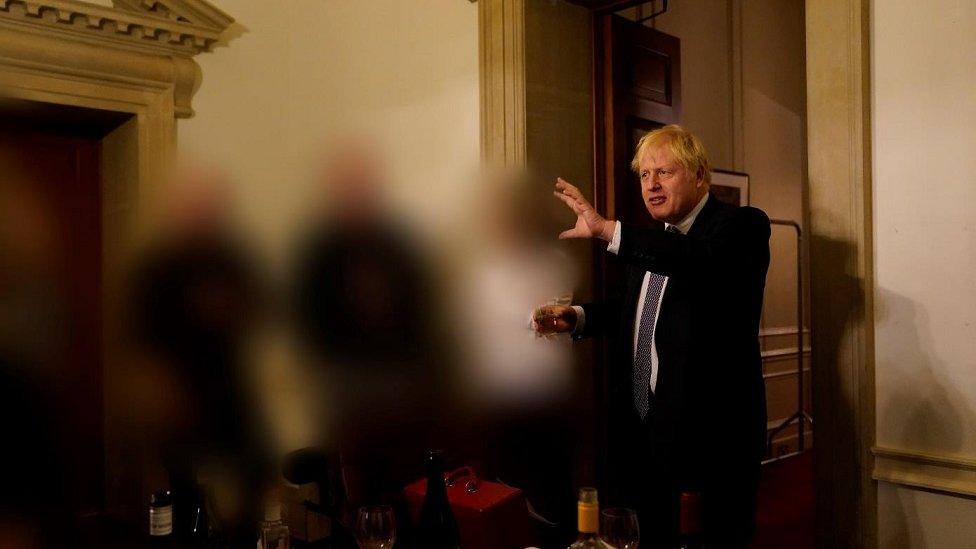What's happening in Parliament this week?
- Published

High energy politics is back in the Commons, with votes on the Budget (and with Labour opposing the plans to remove the upper limit on pension contributions) and on the Northern Ireland "Stormont Brake" mechanism, plus the extraordinary Privileges Committee hearing with Boris Johnson.
The latter promises high drama; the former prime minister will have to explain his statements to the House on the Partygate saga, whether he misled the Commons, and whether any misleading amounted to a contempt of the House (ie whether it was deliberate, reckless, or not corrected when it should have been).
The Committee has a Conservative majority but is chaired by Labour veteran Harriet Harman.
The session will be televised and the committee may take the unusual step of administering an oath.
It will have to recommend a response; anything from declaring no case to answer, to a 10 day plus suspension from the House, which could trigger a recall petition to force a by-election.
Elsewhere, if Baroness Casey's report into the Metropolitan Police, said to contain devastating findings about the culture and standards in the UK's largest police force, emerges next week, the Home Affairs Committee is likely to call her in to give evidence as soon as possible - so keep an eye out for a special evidence session.
MPs have voted to extend the deadline for completing consideration of the long delayed and twice rewritten Online Safety Bill, which has been in limbo for some months. I'm told it will start a marathon eight-day committee stage in the Lords on Tuesday 25th April. There's a certain war-weariness around this Bill, which has been inching through the legislative pipeline for five years, now. All sides now want it passed, but expect further legislation to follow pretty rapidly.
Monday 20 March
Commons: (14:30) Home Office Questions, with any urgent questions or government statements following at 15:30.
Ten minute rule bill: A bill to waive immigration and nationality fees for NHS clinical staff, from the independent MP, Rob Roberts.
Main debate: The continuation of the Budget debate.
Adjournment debate: Labour MP and former army officer Dan Jarvis leads a debate on commemoration of Operation Telic, the UK's military operations in Iraq (2003-09). He wants the debate to be a chance to remember the fallen. Expect the veterans minister, and fellow veteran, Jonny Mercer to reply.
Westminster Hall: (16:30) a debate on E-petitions 606030 "Make it illegal for retailers and services to decline cash payments," and 633284 "Require all businesses and public services (excepting internet-based ones) to accept cash payments".
Lords: (14:30) Peers continue their committee stage yomp through the detail of the Levelling-Up and Regeneration Bill (day 6 of 10).
Tuesday 21 March
Commons: (11:30) Treasury Questions
Ten minute rule bill: Labour's Ben Bradshaw presents a bill to allow Church of England clergy to conduct same sex marriages on CoE premises. There's quite a backstory to this - the General Synod recently approved proposals for blessings for couples entering civil marriages, including same-sex marriages, but rejected attempts to allow same-sex marriage. This Bill seeks to create an opt-in, so individual clergy may perform same-sex marriages in church. Look out for a response from the Conservative Andrew Selous (2nd Church Estates Commissioner) but I'm told he's unlikely to force a vote against the Bill.
There are reservations on two levels; first on the substance of the issue, and second on what would amount to a return to Parliament directing the Church of England on doctrinal matters.
Main debate: The conclusion of the Budget debate - followed by a vote to authorise collection of taxes - income tax, fuel duty etc - in advance of the Finance Bill, which will appear in the coming weeks. This is normal procedure under the 1968 Provisional Collection of Taxes Act.
Committees: Treasury (09:45) kicks off its scrutiny of the Spring Budget with the constitutionally-required appearance by Torsten Bell. of the Resolution Foundation, and Paul Johnson of the Institute for Fiscal Studies.
Lords: (14:30) Peers rattle through a series of legislative chores - considering Commons amendments to the Seafarers' Wages Bill, and the Social Housing (Regulation) Bill, with the possibility of a vote on the Higher Education (Freedom of Speech) Bill, where MPs have put back in a clause, removed by peers, which allows people to sue a higher education provider or students' union for failure to protect freedom of speech.
Wednesday 22 March
Commons: (11:30) Northern Ireland Questions, followed, at noon, by Prime Minister's Question Time.
Ten minute rule bill: Conservative Natalie Elphicke wants to ban age discrimination by employers in relation to insurance and financial services.
Main debate: A highly unusual prime-time Commons debate and vote on a statutory instrument - the regulations to implement the "Stormont brake" on EU laws being applied to Northern Ireland. There's no prospect of the government losing this vote, despite some dissent on the Conservative benches, because Labour have promised to support it - but keep an eye on Tory votes against or abstentions, and on the stance taken by the DUP.
MPs will also look at Lords amendments to the Public Order Bill, which is now ping-ponging between the two Houses. In their most recent debates, peers voted to raise the rank required to authorise stop and search without suspicion to Chief Superintendent, remove intentional public nuisance as a criterion. Expect the government majority in the Commons to strike those changes down.
Westminster Hall: Labour's Geraint Jones leads a debate on the specialist workforce for children with special educational needs or disabilities (09:30)

Boris Johnson will be quizzed about what he told MPs
Committees: The biggest and most extraordinary event of the week. Former PM Boris Johnson will give evidence to the privileges committee (14:00) in their investigation into Partygate.
Elsewhere, Transport (09.30) begins its inquiry on the government's "minimum service levels" Strikes Bill. and what it will mean in practice for the railways.
Lords: (15:00): Levelling-Up and Regeneration Bill - Committee (day 7 of 10)
Thursday 23 March
Commons: (09:30) Questions to the reshaped Business and Trade Department, followed by the weekly update on the forthcoming Commons agenda, from the Leader of the House.
Main debate: Backbench debates on World Down Syndrome Day (led by Dr Liam Fox, author of the Down Syndrome Act) and on tackling the "Energy Trilemma" - the need to balance energy reliability, affordability, and sustainability and its impact on everyday lives.
Westminster Hall: Backbench debates on Whistleblowing Awareness Week (13:30) and Support for Women in Poverty (15:00).
Lords: (11:00) Strikes (Minimum Service Levels) Bill - Committee (day 2 of 2)
Friday 24 March
Commons: (09:30) Three more laws proposed by individual MPs emerge from their committee scrutiny and return to the chamber - Conservative Greg Clark's Protection from Sex-based Harassment in Public Bill, which creates a specific offence to tackle public sexual harassment in England and Wales, as recommended by the Law Commission.
That's followed by the Ballot Secrecy Bill from the Conservative Paul Bristow, which aims to stop so-called "family voting" where people are accompanied into a polling booth by a member of their family.
Third is the Workers (Predictable Terms and Conditions) Bill from the Conservative, Scott Benton, which creates a right to request more predictable terms and conditions.
After those three have been dealt with, there may be time for some debate on Lib Dem Sarah Olney's Minimum Energy Performance of Buildings Bill - but it's unlikely to get approval for further consideration.
Lords: (10:00) Peers rattle through the (probably very brief) Third Readings of the Mobile Homes (Pitch Fees) Bill and the Universal Credit (Removal of Two Child Limit) Bill.
Then they move onto the Second Readings of Bills from the Commons, the Co-operatives, Mutuals and Friendly Societies Bill -- which aims to protect them from demutualisation, the Neonatal Care (Leave and Pay) Bill, the
Shark Fins Bill and the Worker Protection (Amendment of Equality Act 2010) Bill.
